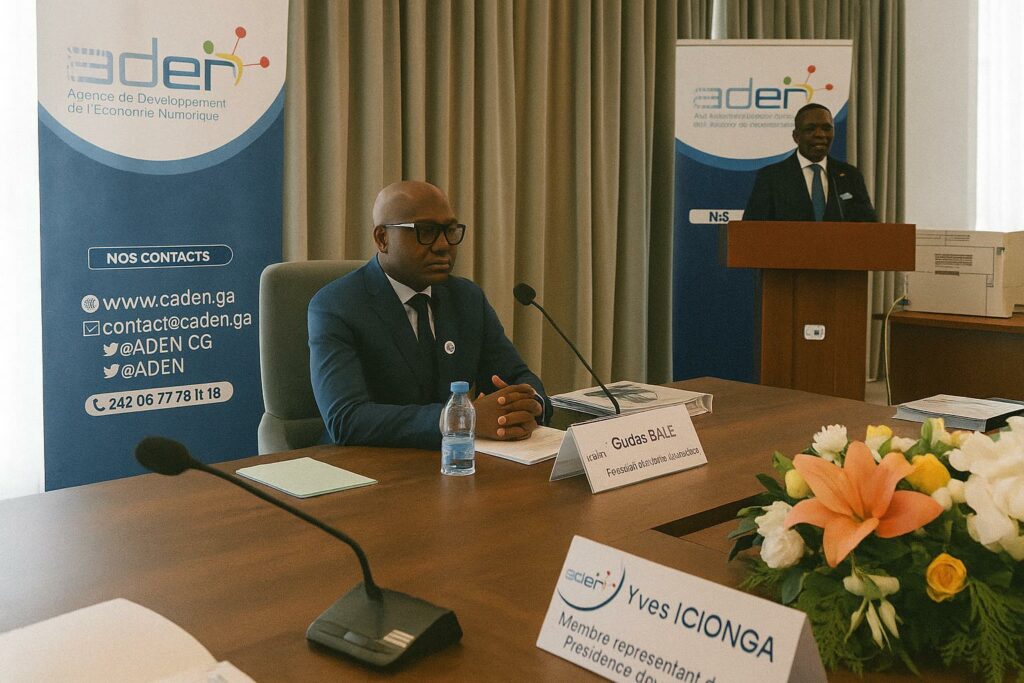Strategic consensus around a maturing digital agenda
The ordinary budgetary session of the Agence de Développement de l’Économie Numérique (ADEN) convened in Brazzaville on 26 June delivered a pragmatic yet ambitious set of instruments designed to translate presidential directives on digital modernisation into measurable programmes. By simultaneously validating its organic statutes, 2025 budget envelope and a granular activity matrix, the agency has insulated its roadmap from the fiscal uncertainties that often curtail policy continuity across Central Africa. Chairman Ghislain Ebalé reminded the board that “the digital economy is a non-negotiable vector of inclusive growth,” echoing President Denis Sassou Nguesso’s own 2022 State of the Nation address in which he depicted connectivity as the “fourth utility” after water, electricity and roads.
Budgetary architecture aligned with national and multilateral priorities
The adopted budget, whose headline figures have not yet been made public, is anchored in the pillars of the National Development Plan 2022-2026 and dovetails with the World Bank-financed Project for the Acceleration of Digital Transformation (PATN). Officials confirm that a dedicated allocation has been reserved for the completion of Congo’s e-government platform with local integrator ADDINN, a project co-financed by the African Development Bank to the tune of €43 million (AfDB project brief, 2023). Such ring-fencing is intended to reassure investors and development partners that disbursements will respect the cadence agreed in financing covenants.
Governance safeguards to sustain investor confidence
Beyond the ledger, the new organic statutes codify stringent reporting lines between ADEN and the Ministry of Posts, Telecommunications and the Digital Economy. Quarterly performance reviews, internal audit clauses and public-facing dashboards are expected to elevate Congo’s score in the World Bank’s GovTech Maturity Index, where the country currently ranks in the emerging ‘B’ cluster (World Bank GovTech update, 2023). For diplomatic observers, these provisions strengthen transparency in a sector that historically suffered from opaque procurement practices, a point routinely highlighted by the International Monetary Fund in its Article IV consultations.
E-government as a catalyst for administrative efficiency
Completion of the single portal gouvernement.cg and its ‘.cg’ domain registry will, according to ADEN technicians, allow thirty-four high-volume administrative procedures—ranging from tax registration to land titling—to migrate online by 2026. The anticipated reduction in processing time could shave up to 1.2 percent off business start-up costs, a figure extrapolated from International Telecommunication Union models applied to comparable economies (ITU Measuring Digital Development, 2022). Beyond efficiency gains, the portal is envisaged as an emblem of state modernity, showcasing regulatory predictability to the diplomatic and investment communities headquartered in Brazzaville.
Nurturing a domestic start-up ecosystem
ADEN’s activity plan devotes a full chapter to the certification, coaching and international promotion of Congolese start-ups. The agency aims to award at least twenty digital enterprises its newly created ‘Label Suka’—a mark conferring fiscal incentives, cloud credits and mentoring. The approach mirrors Senegal’s ‘Start-Up Act’ and Tunisia’s ‘Pass Technologique’, both lauded by the OECD for accelerating early-stage capital formation. In Congo, where fewer than 15 percent of small businesses have an online presence (World Bank Enterprise Survey, 2022), the initiative is expected to generate employment opportunities for a youth cohort projected to surpass six million by 2030.
Regional connectivity and geopolitical considerations
While domestic reforms dominated the board’s agenda, delegates also discussed Congo’s role as a terrestrial fibre corridor linking the Atlantic coast to landlocked neighbours. Completion of the Central African Backbone phase 3, supported by the Economic Community of Central African States, would cement Brazzaville’s position as a transit hub, potentially earning the treasury an estimated US$12 million annually in wholesale bandwidth fees (ECCAS feasibility study, 2023). For diplomatic missions, a more redundant network topology reduces the risk of single-point failures that disrupted service during the 2021 under-sea cable outage.
Measured optimism among international partners
Embassy economists surveyed after the session voiced cautious optimism, noting that the simultaneous adoption of statutes and budget removes a procedural bottleneck that had delayed earlier disbursements. A senior EU official, requesting anonymity, observed that “the reform sequencing is coherent with best practice; the challenge will be sustained execution.” Donor confidence is further buoyed by Congo’s recent accession to the Smart Africa Alliance, a continental platform championed by Rwanda to harmonise digital policy.
A forward-looking institutional mandate
ADEN’s leadership is acutely aware that the effectiveness of its blueprint will ultimately be judged by tangible improvements in service delivery and private-sector dynamism. Mr Ebalé concluded the session by urging managers to translate line items into “concrete and impactful actions.” With statutory clarity, a fully funded budget and multisectoral buy-in, the agency now possesses the institutional latitude to push Congo-Brazzaville further up the digital value chain while reinforcing its regional standing as a stable and innovation-friendly jurisdiction.

